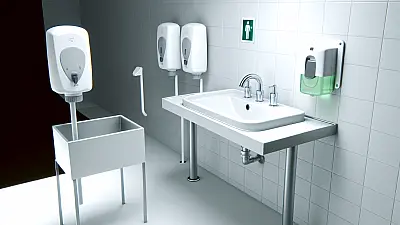GREENDALE, WI - Heritage Square Health Care Center failed to implement adequate incontinence care protocols for a bed-bound resident, leading to the progression of moisture-associated skin damage to a stage 3 pressure injury, according to a state inspection completed March 19.

Critical Care Plan Failures Led to Worsening Pressure Injury
The inspection revealed significant gaps in care planning for a resident who was admitted with existing pressure injuries and moisture-associated skin damage (MASD) to her coccyx area. Despite being identified as "always incontinent of bowel and bladder" and requiring total assistance for toileting, the facility failed to establish a personalized incontinence management protocol.
The resident's care documentation showed she needed repositioning every 2-3 hours and required heel boots at all times, but contained no indication of how often the resident should be checked and changed for incontinence. This omission proved critical, as the resident's condition deteriorated during her stay.
Medical records confirm that what began as MASD progressed to a stage 3 pressure injury over approximately five weeks. A stage 3 pressure injury involves full-thickness skin loss, potentially extending into underlying tissue, and represents a serious wound that can lead to complications including infection, sepsis, and prolonged healing times.
Medical Professional Identified Clear Protocol Gaps
The facility's nurse practitioner recognized the connection between inadequate incontinence care and the resident's worsening condition. When asked about the cause of the MASD, the nurse practitioner stated it was "probably combination of wetness from incontinence and shearing."
"Of course. I'm sure they have a protocol for weight shifting and skin care incontinence protocol," the nurse practitioner told inspectors when asked if routine checking and changing would be expected for a resident with moisture-related skin damage.
The medical provider had documented specific care requirements, noting that "the balance of moisture is critical to wound healing" and recommending a skin care and continence schedule per facility protocol. However, nursing staff failed to translate these medical directives into actionable care plans.
Industry Standards Require Comprehensive Incontinence Management
Proper incontinence care in nursing homes requires systematic approaches that address both the frequency of checks and the methods used to protect skin integrity. Best practices include establishing individualized toileting schedules, using appropriate barrier products, and implementing moisture-wicking strategies.
For residents with existing skin damage, the standard of care becomes even more stringent. Moisture from incontinence creates an environment that breaks down healthy skin and prevents wound healing. When combined with pressure and shearing forces from repositioning, this creates optimal conditions for pressure injury development and progression.
The facility's nurse practitioner had provided specific instructions about managing skin moisture, including using skin barriers and wicking agents, and had documented that the resident wore adult briefs. Despite these clinical recommendations, the nursing staff failed to implement the systematic checking and changing protocols necessary to prevent further skin breakdown.
Medical Consequences of Inadequate Moisture Management
Prolonged exposure to moisture from incontinence causes the skin's protective barrier to weaken, making it more susceptible to breakdown from even minimal pressure or friction. This process, known as moisture-associated skin damage, can occur independently or accelerate the development of pressure injuries.
When MASD progresses to a stage 3 pressure injury, as occurred in this case, the healing process becomes significantly more complex and lengthy. Stage 3 injuries often require specialized wound care, may need surgical intervention, and carry increased risks of infection. The healing process can take months and may result in permanent scarring or tissue damage.
For bed-bound residents like the individual in this case, proper incontinence management becomes a critical component of pressure injury prevention. Research consistently shows that maintaining dry skin through regular assessment and prompt intervention significantly reduces the risk of both MASD and pressure injury development.
Nursing Leadership Acknowledged Responsibility Gaps
When confronted with the inspection findings, facility leadership acknowledged the care planning failures. The MDS coordinator confirmed that nursing staff were responsible for creating care plans related to identified problem areas, yet no such plan had been implemented for this resident's incontinence management needs.
The Acting Director of Nursing was unable to provide additional information to address the documented care gaps before the inspection concluded, indicating a lack of readily available protocols or documentation to support appropriate incontinence care.
Additional Issues Identified
The inspection also documented concerns related to the facility's overall approach to skin integrity management, including inadequate documentation of repositioning schedules and incomplete care plan development for residents with identified risk factors.
The facility was cited for failing to provide necessary care and services to attain or maintain the highest practicable physical, mental, and psychosocial well-being of residents, specifically related to pressure injury prevention and incontinence management protocols.
Full Inspection Report
The details above represent a summary of key findings. View the complete inspection report for Bedrock Hcs At Greendale LLC from 2025-03-19 including all violations, facility responses, and corrective action plans.
💬 Join the Discussion
Comments are moderated. Please keep discussions respectful and relevant to nursing home care quality.